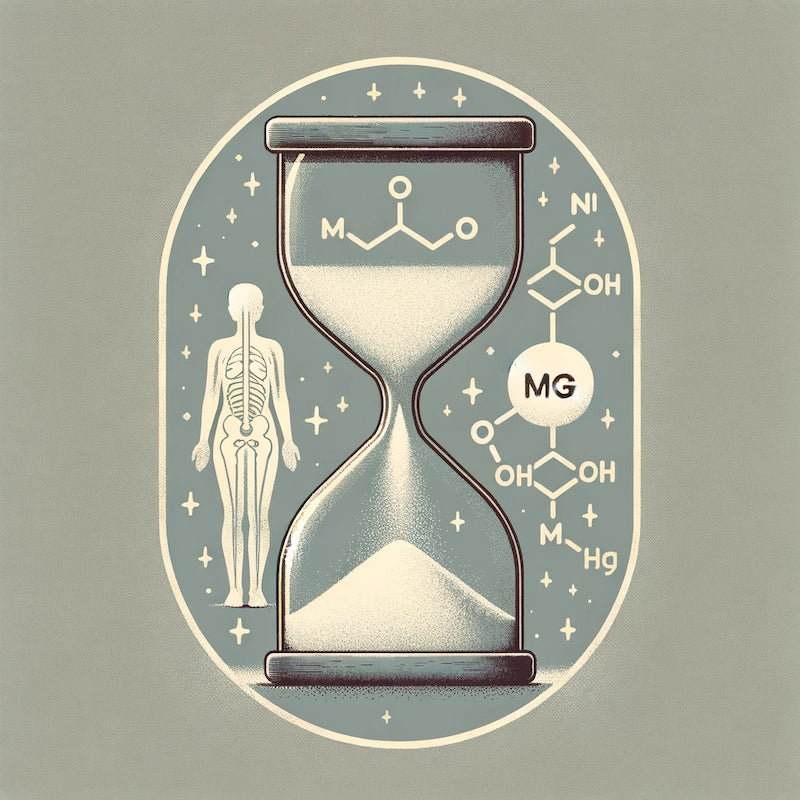MAGNESIUM: A POWER BOOSTER
According to the NIH, magnesium is an essential mineral vital to the health and well-being of the human body. It plays a central role in more than 300 biochemical processes, making it one of the most versatile and important elements of our diet. From supporting muscle and nerve function to promoting a healthy heart rhythm and strengthening the immune system.
However, in our modern diet, this important nutrient is often given insufficient attention, which can lead to a deficiency resulting in a variety of health problems. In this article we look at the multiple functions of magnesium, its sources, the effects of a deficiency and how to ensure an adequate supply to optimise and maintain health.

WHAT IS MAGNESIUM CITRATE?
Magnesium citrate is a form of magnesium supplement that combines the mineral magnesium with citric acid. Magnesium is an essential mineral for various functions in the body, such as maintaining bone health, proper muscle and nerve function, and blood sugar regulation.
The citric acid in magnesium citrate not only helps improve the absorption of magnesium in the gut, but may also have acidifying and alkalinising properties in the body, depending on the context.
Magnesium citrate is commonly used as a dietary supplement to address magnesium deficiencies or to help with medical conditions that may benefit from increased magnesium intake.
It is also sometimes used as a laxative to relieve constipation, as it can have a mild laxative effect. It is important to note that, as with any supplement, it is advisable to consult with a healthcare professional before starting to take magnesium citrate, especially if you have any pre-existing medical conditions or are taking other medications.

WHAT IS MAGNESIUM FOR + WHAT ARE THE BENEFITS OF TAKING IT?
1. Maintaining Bone Health: Magnesium is essential for the formation and maintenance of healthy bones. It aids in the absorption of calcium and plays a crucial role in bone mineralisation, which may contribute to the prevention of diseases such as osteoporosis.
2. Muscle and Nerve Function: Magnesium is necessary for proper muscle contraction and relaxation. It also plays a role in the transmission of nerve impulses, thus contributing to the optimal functioning of the nervous system.
3. Blood Sugar Regulation: Magnesium is involved in the activity of insulin, the hormone responsible for regulating blood sugar levels. It has been suggested that adequate levels of magnesium may help reduce the risk of type 2 diabetes.
4. Constipation Relief: Magnesium citrate, in particular, is sometimes used as a mild laxative. It helps soften the stool and facilitates its passage through the intestine, thus relieving occasional constipation.
5. Cardiovascular Support: Magnesium plays a role in regulating heart rate and blood pressure. It has been associated with a lower risk of cardiovascular disease, although the exact relationship is still under investigation.
6. Stress and Anxiety Reduction: Some research suggests that magnesium may have beneficial effects in reducing stress and anxiety. It is involved in the production of neurotransmitters that affect mood.

Magnesium and the liver
What are the benefits of magnesium for the liver?
Magnesium plays an essential role in several physiological processes that can positively influence liver health. Some of the benefits of magnesium for the liver include:
1. Detoxification: The liver is responsible for detoxifying the body, and magnesium may support this process by participating in the conjugation and neutralisation of toxins and chemicals.
2. Enzyme regulation: Magnesium is necessary for the activity of many enzymes, including those involved in the synthesis and breakdown of proteins and carbohydrates. This may influence the regulation of liver function.
3. Reducing inflammation: Magnesium has anti-inflammatory properties, and chronic inflammation may play a role in various liver diseases. Magnesium may help reduce inflammation in the liver.
4. Prevention of Hepatic Steatosis: Non-alcoholic hepatic steatosis (NASH), or non-alcoholic fatty liver disease (NAFLD), is a condition characterised by the accumulation of fat in the liver. Some studies suggest that magnesium may play a role in preventing or improving this condition.
5. Blood Sugar Regulation: Maintaining healthy levels of magnesium may contribute to blood glucose regulation, which is important for preventing liver problems related to insulin resistance and diabetes.
6. Protection against Oxidative Stress: Magnesium has antioxidant properties, which means it can help protect liver cells from damage caused by oxidative stress.
It is important to note that while magnesium may be beneficial for liver health, its specific impact may vary depending on individual liver condition and other health factors.
As always, it is recommended that you consult a healthcare professional before starting any supplementation, especially in the case of pre-existing liver disease or taking medication.

WHAT MAKES OUR MAGNESIUM ESSENTIAL BEARS SO SPECIAL?
Our Magnesium Bears contain 250 mg magnesium citrate. Together with the natural magnesium in food, you can easily reach your recommended daily amount.
As they can be taken individually, you can divide them into two or more servings. They are 100% vegan and gluten-free, making them suitable for people with different dietary requirements.
They have a delicious passion fruit flavour and are also sugar-free.

NASSIM JAMALZADEH:
"Magnesium makes a decisive contribution to the regulation of muscle function. Especially during intense physical activity, it is advisable to take magnesium supplements to maintain muscle function and support regeneration processes. Magnesium is also very important for maintaining bone health and dental care. Therefore, I strongly recommend paying attention to a magnesium balance and taking magnesium supplements."
FAQs about magnesium
FAQs about magnesium
Yes, you can take magnesium during pregnancy. However, you should consult your doctor before taking it. The German Nutrition Society, for example, recommends a daily magnesium intake of 310 mg for pregnant women. However, you should always pay attention to the dosage during pregnancy, as a large amount of magnesium can cause diarrhoea or at least loose stools. This is mainly because magnesium relaxes the muscles and thus softens the intestinal musculature, for example.
Our bears have been developed for the adult body, so we can only make a recommendation for adults. It is noted that children aged 4 to 13 years (depending on age and gender) should take 120 to 250 milligrams of magnesium per day. Adolescents from the age of 13 (depending on age and sex) have a daily requirement of 310 to 400 milligrams of magnesium. We recommend consulting your doctor before taking our bears and reducing the dose to 2 bears a day.
We recommend that you stick to the recommended intake. An overdose can have very unpleasant consequences. Additional magnesium intake of 300 mg per day or more can lead to diarrhoea and gastrointestinal discomfort. A dose of more than 2,500 mg per day can even have very dangerous side effects, such as a drop in blood pressure or muscle weakness.















